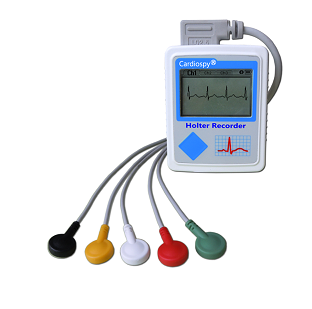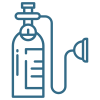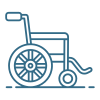Holter Monitor For Rent/Sale in Ahmedabad
Do you want to rent the best holter monitor in Ahmedabad? You’ve arrived at your destination. We at Medintu offer the best Holter Monitor in Ahmedabad for very affordable cost, call us now at +919100907622 for booking your holter monitor at your door-steps.

Our quality services and commitment help our customers to grab the best health products.
Get Holter Monitor For Rent or Sale Now
What is Holter Monitor?
A Holter monitor is a portable, battery-powered device that continually detects and records your heart’s electrical activity (ECG) for 24 to 48 hours or longer, depending on the type of monitoring being utilised. Its size is comparable to a compact camera. It attaches to your skin with wires that have electrodes the size of silver dollars.
A Holter monitor is a kind of heart monitor that is capable of spotting and catching the minute electrical signals that your heart delivers to the surface of your chest. A Holter monitor is typically worn so a skilled expert, like a cardiologist, can check to see if your heart is functioning normally or spot a problem.
The best Holter monitor in Ahmedabad is available from Medintu, the most reputable provider of healthcare services. A Holter monitor can also be rented online through Medintu while you’re at home.
Prices
Ambulatory Monitor - Per Session
Rs. 3999
Holter Monitor DigiTrak XT - Per Session
Rs. 4200
When is Holter Monitor used?
Dizziness, palpitations, shortness of breath, fainting spells, and chest discomfort are just a few of the symptoms that might occur. Finding out if your heart is the source of your symptoms requires the use of a Holter monitor. Lightheadedness or fainting may be brought on by either an excessively quick or excessively sluggish heartbeat. However, these symptoms might not continue long enough to be detected on an ECG in the office or emergency room of your healthcare physician. When palpitations, a feeling of rapid or irregular heartbeats, begin in the upper heart chambers, they rarely pose a threato life. However, if they begin in the lower chambers, they can occasionally pose a major health risk. Holter monitors can frequently identify the cause of palpitations and assist your doctor in selecting a course of treatment.
Atherosclerosis, often known as “hardening of the arteries,” can completely or partially obstruct the coronary arteries. The artery responds to impulses by widening or narrowing. The blood supply to the heart muscle may temporarily decline in response to either type of signal. These occurrences can be picked up by the Holter monitor, which can notify your doctor of potential issues. It can assist in locating those who are more susceptible to sudden death or a heart attack.
How does a Holter monitor work?
In most cases, a Holter monitor recording is performed without hospitalisation. Procedures may change based on your illness and the way your doctor treats patients.A Holter monitor recording often goes like this:
- Any jewellery or other items that can obstruct the reading will need to be taken off.
- To allow electrodes to be placed to your chest, you will be requested to take off your clothes from the waist up. By covering you with a sheet or gown and exposing only the essential skin, the technician will preserve your privacy.
- To ensure that the electrodes will adhere firmly to the skin, the areas where the electrode patches will be applied are cleansed, and in certain situations, hair may be shaved or cut.
- Your chest and abdomen will both have electrodes inserted. Wires will be used to link the electrodes to the Holter monitor. The tiny monitor box can be clipped to a belt or pocket or worn around your waist or over your shoulder like a shoulder bag.
- Find out if you need to replace the monitor’s batteries. Aside from having extra batteries on hand, make sure you know how to do it.
- Unless your healthcare practitioner instructs you otherwise, you can resume your regular activities after being connected to the monitor and receiving instructions, including work, housework, and exercise. Your healthcare physician will be able to recognise issues that might only arise during particular activities thanks to this.
- You’ll be told to record your actions while wearing the monitor in a journal. If any symptoms, including dizziness, palpitations, chest pain, or other previously reported symptoms, emerge, be sure to note the date and time of your activities.
What is the purpose of wearing Holter monitors?
Regular electrocardiograms (ECGs or EKGs) allow your doctor to view the activity of your heart at a specific moment in time while doing an ECG test. However, irregular heartbeats and cardiac symptoms might come and go. Because of this, your doctor could decide to periodically check your heartbeat as you go about your daily business. If you experience arrhythmias—rapid, slow, or irregular heartbeats—you can be advised to wear a Holter monitor.Your doctor may learn the following from having you wear the monitor:
- The cause of symptoms including lightheadedness, dizziness, or the sensation that your heart is pounding or skipping a beat.
- If your heart is receiving the necessary amount of oxygen.
Medical Equipment
FAQ's
The price of a Holter monitor typically varies depending on the test’s type, objectives, and patient’s health. The average cost of a holter monitor in Ahmedabad is 1,500 rupees, with a maximum cost of 3000 rupees.
You might have some itchiness or discomfort from a Holter monitor, but there are no hazards or pain related with it.
Holter monitoring is used to determine the source of arrhythmia, heart palpitations, unexplained dizziness, as well as to determine whether your heart is receiving the right amount of oxygen, whether heart drugs are working, and whether your pacemaker is functioning.
If your EKG or other form of cardiac test is ambiguous, you might need to undergo a Holter monitor. A Holter monitor will assist the doctor by acquiring extra data about your cardiac activity if the EKG is unable to identify the issue.
The Holter monitoring equipment must be worn around your waist and secured by a belt or waistband.






